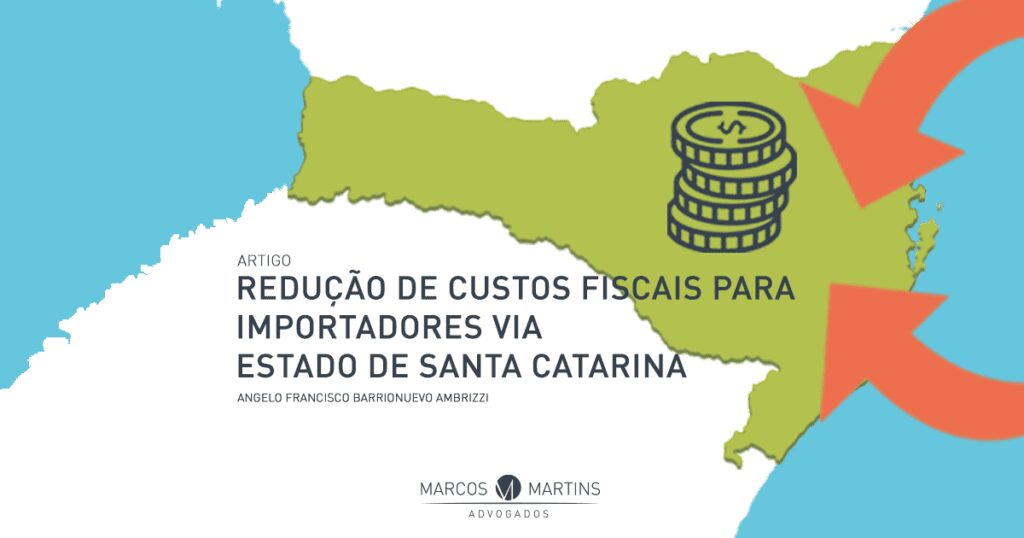Angelo Francisco Barrionuevo Ambrizzi
Lawyer at Marcos Martins Advogados
Every entrepreneur is concerned with seeking tax reductions in operating costs, whether to gain a competitive advantage, win market share or even make their product or service viable.
It is a recurring theme in conversations between importers that the search for cost reductions focuses on the following issues:
- Re-evaluating the logistics process: this is one of the biggest costs in importing, but the challenge is to balance logistics costs without increasing the waiting time for goods;
- Possibility of outsourcing the import process: due to the numerous rules surrounding the import process, one way of reducing costs is to hire companies that specialize in your product niche;
- Mastering the legislation and looking for safe tax incentives: knowledge of tax legislation is fundamental for the import area, both because there is a barrier tax (II) and because there are other taxes levied in order to make the imported product equivalent to the national product. In addition to tax rules, there are countless others relating to the activity of importing, whose changes are constant and often generate doubts.
In this article I’ll talk a little about a possible alternative to tax legislation for reducing costs via a tax benefit, the subject of a recent study.
As you know, the taxes levied on the import of goods are a) Federal: Import Tax (II); Tax on Industrialized Products (IPI); Social Integration Program (PIS); Contribution for Social Purposes (COFINS); and b) State: Tax on the Circulation of Goods and Services (ICMS).
The tax most likely to be granted a tax benefit is the Tax on the Circulation of Goods and Services (ICMS), and many are aware of the various benefits spread across several states. This is because the Federal Constitution gave the states and the Federal District autonomy to change the ICMS rates.
As a result, states seeking to boost the local economy grant taxpayers more attractive rates and benefits than other states, but many of these incentives do not respect legal formalities and give rise to the “fiscal war”.
The Santa Catarina State Secretariat created and developed the Differentiated Tax Treatment Module – TTD with the aim of managing the granting of Special Regimes related to the payment of tax on imported goods, such as exemption, deferral, suspension, or the exemption or adaptation of compliance with accessory obligations.
The most interesting benefits for the import sector are the so-called TTD 409, 410 and 411, which regulate certain ICMS benefits, guaranteeing the importing taxpayer certain advantages.
Without specifying the various types of differentiated treatment, but only focusing on the benefits in a comprehensive manner, importing through the state of Santa Catarina gives importers the following advantages: 1. Possibility of deferral of ICMS on the import of goods intended for commercialization; 2. Possibility of partial deferral in the internal operation following importation; and 3. Presumed credit in the operation following the import of goods for commercialization[1].
There are also differentiated rates for some products that are imported.
There is an administrative procedure for granting the TTD with some requirements, among them: 1 – the company has its headquarters in the state of Santa Catarina; 2 – the company makes a voluntary contribution to the Special Funds set up by the state of Santa Catarina; and 3 – as a rule, the goods must be docked in the state of Santa Catarina.
The granting of the benefit is the result of an analysis of the above-mentioned requirements, and the interested company can apply through an administrative process and wait for it to be granted.
Another possibility is for the importer to use a Trading company that has already been granted this benefit, which is often more advantageous for reasons of time, cost or the seasonality of imports. The simulation of tax gains must be carried out individually for each company, in view of the various Differentiated Treatments, various imported products and other variables, such as importing for resale or importing raw materials, or even importing parts and pieces for permanent assets.
There is no denying that there is a significant tax advantage, which is reflected in reduced import costs, improved cash flow and a competitive advantage over competitors who have not yet planned properly and legally.
In conclusion, the aim of this article is to show that there is yet another good alternative for possibly reducing the tax burden for importers, whose actual results and measurement of possible risks will be revealed after studying the specific case.
The team at Marcos Martins Advogados has extensive experience in analyzing legislation, studying possible risks and implementing tax strategies for various sectors, including imports, and is qualified to answer all questions aimed at guaranteeing your company’s maximum performance.
[1]CAF – Central de Atendimento Fazendário. 653 – Differential tax treatment – TTD 409, 410 and 411 – General Rules. Available at: http://caf.sef.sc.gov.br/Views/Publico/BaseConhecimento/BuscarBaseConhecimento.aspx?assunto=12








